Jing WANG, a PhD student in the department of Creative Technology, SciTech, just got a paper accepted by 26th International Joint Conference on Artificial Intelligence (IJCAi 2017). IJCAi (http://ijcai-17.org/), is a premier AI conference in the world. Jing’s paper, co-authored with Feng Tian (SciTech), Hongchuan Yu (FMC) and Changhong Liu (SciTech), “Multi-Component Nonnegative Matrix Factorization”, is one of the papers accepted, out of 2540 submissions, after going through an extremely selective review (acceptance rate: ~25%).
Category / PG research
This part of the blog features news and information for postgraduate research students and supervisors
Recent Writing from Kip Jones Available on the Internet

“Kyle’s photo-montage of black and white clippings, mostly from fashion magazines, Bailey and Avedon, etc., glued to the walls surrounding his bed”.
Kip Jones is pleased to announce that the tripartite story, “True confessions: why I left a traditional liberal arts college for the sins of the big city”, first published in Qualitative Research Journal, is available on Academia.edu. Jones is particularly pleased that what is now called ‘auto-fiction’ has been accepted for publication by such a major qualitative journal. The three stories in the article conclude with a scene from Jones’ ongoing development of the feature film script for “Copacetica”. All three stories portray aspects of the sexual fumbling and romantic insecurities typical in youth.

“Dirty Frank’s” bar, Philadelphia, where the main characters of “Copacetica” frequently meet.
The second piece of writing consists of the bar scene from “Copacetica”. This is the scene in which all the major characters are introduced and the story sets up the conundrum that the main character will face in the film.
“Copacetica” tells the tale of a gullible youth on a roller coaster ride of loss of innocence and coming out in the flux and instability of 1960s hippy America. Often seen as a period of revolution in social norms, Copacetica’s themes include being different, the celebration of being an outsider, seeing oneself from outside of the “norm”, and the interior conflicts of “coming out” within a continuum as a (gay) male in a straight world. These observations are set within the flux and instability of a period of great social change, but which are often viewed in retrospect as consistent and definable. Being straight or being gay can also be viewed in a similar way within the wider culture’s need to set up a sexual binary and force sexual “choice” decision-making for the benefit of the majority culture, or ‘heteronormativity’. Through the device of the fleeting moment, the story interrogates the certainties and uncertainties of the “norms” of modernity.
In the later gallery scene (not yet published), a minor character explains the meaning of the word, “copacetic”:
VISITOR TWO What d’he say? VISTOR ONE “Everything’s copacetic”! (Beat) What does that mean, anyway? VISITOR THREE Everything’s cool. Everything’s okay. Or “Groovy” as they like to say.
Asked what he enjoyed about writing the script for this film, Jones said, “Definitely revisiting the slang used by youth of the 1960s! It’s virtually its own language. And writing the sex scenes. Exciting and very tiring. Almost like the real thing”.
You can read the opening scene planned for the film on KIPWORLD: “Copacetica” Scene 1. EXT SUBURBAN HOUSE POOL NIGHT
A Cloud-Based Collaborative Virtual Learning Environment (VLE) for the Higher Education Institutions (HEIs) in the Sultanate of Oman
We would like to invite you to the latest research seminar of the Centre for Games and Music Technology Research.
Title: A Cloud-Based Collaborative Virtual Learning Environment (VLE) for the Higher Education Institutions (HEIs) in the Sultanate of Oman.

Speaker: Mohammed Al hajri
Time: 2:00PM-3:00PM
Date: Wednesday 3rd May 2017
Room: PG11, Poole House, Talbot Campus
Abstract: It is becoming increasingly difficult to ignore the demand to migrate or to adopt cloud computing into not only companies but also educational institutions. New trends in this promising field have been playing significant and critical roles in delivering educational services and applications to stakeholders.
Oman and other developing countries could benefit from a cloud-based collaborative VLE where students and faculty members could have access to online facilities to collaborate effectively achieving the potential aims of their courses and programs. HEIs especially in Oman spend high portions of their budgets to establish and maintain IT systems while not all HEIs can afford to have their separate IT systems network due to its unaffordable cost.
This research critically assesses the current ICT infrastructure and any cloud-based collaborative initiatives used in Universities and Colleges in Oman and attempt to explore the existing VLEs in HEIs in Oman. Furthermore, the research will develop a framework which will adopt the contribution from analysing any related frameworks and models in the field or in adjacent areas. The proposed framework is aiming to make a unified and collaborative VLE that can be shared and utilised by several HEIs in Oman which will enable them to exchange and share educational resources among themselves and to reduce the cost of IT expenses in software, hardware and technical support. Thus, this research is aiming to get the maximum benefits of cloud computing to be applied in collaborative VLEs and use it as a model to improve the current IT infrastructure implemented in this environment. Also, the proposed framework can be adapted and adopted by similar developing countries.
We hope to see you there.
Nepali migrant workers in India #GlobalFoL17 presentation in Delhi
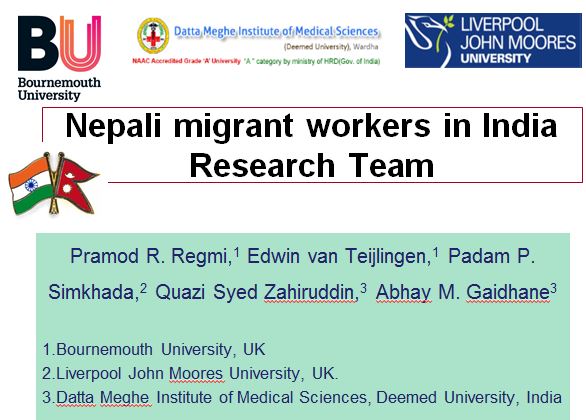 On the last day of BU’s Global Festival of Learning-India 2017 Prof. Edwin van Teijlingen presented the following paper: ‘Nepali migrant workers: trials & tribulations’. The Global Festival of Learning-India 2017 took place at Symbiosis School for Liberal Arts in Pune and at the India Habitat Centre in the capital Delhi. The session offered insight from various studies on Nepali migrant workers conducted by Bournemouth University staff and students.[1-3] It included preliminary results from an on-going study of Nepali migrant workers in India. The latter study is a close collaboration between Pramod Regmi and Edwin van Teijlingen) in the Faculty of Health & Social Sciences, Indian colleagues at Datta Meghe Institute of Medical Sciences, Deemed University in India (Quazi Syed Zahiruddin, Abhay M. Gaidhane), and Padam Simkhada at Liverpool John Moores University (LJMU).
On the last day of BU’s Global Festival of Learning-India 2017 Prof. Edwin van Teijlingen presented the following paper: ‘Nepali migrant workers: trials & tribulations’. The Global Festival of Learning-India 2017 took place at Symbiosis School for Liberal Arts in Pune and at the India Habitat Centre in the capital Delhi. The session offered insight from various studies on Nepali migrant workers conducted by Bournemouth University staff and students.[1-3] It included preliminary results from an on-going study of Nepali migrant workers in India. The latter study is a close collaboration between Pramod Regmi and Edwin van Teijlingen) in the Faculty of Health & Social Sciences, Indian colleagues at Datta Meghe Institute of Medical Sciences, Deemed University in India (Quazi Syed Zahiruddin, Abhay M. Gaidhane), and Padam Simkhada at Liverpool John Moores University (LJMU).
The presentation also highlighted some of the key findings form our recently published paper ‘Identifying the gaps in Nepalese migrant workers’ health and well-being: A review of the literature’ in the Journal of Travel Medicine.[1] The paper is co-authored by BU’s Pramod Regmi and Edwin van Teijlingen, and Padam Simkhada (LJMU) and our Nepali colleague Nirmal Aryal based in New Zealand.
 Dr. Shweta Sinda Deshpande, who chaired the session, originated from an Indian village a few miles from the Nepali border. Moreover, she is also an anthropologist who had done fieldwork with Nepali migrant workers in India. Her informed contribution was very much welcomed by the audience.
Dr. Shweta Sinda Deshpande, who chaired the session, originated from an Indian village a few miles from the Nepali border. Moreover, she is also an anthropologist who had done fieldwork with Nepali migrant workers in India. Her informed contribution was very much welcomed by the audience.
References:
- Simkhada, P.P., Regmi, P.R., van Teijlingen, E., Aryal, N. (2017) Identifying the gaps in Nepalese migrant workers’ health and well-being: A review of the literature, Journal of Travel Medicine 24(4): 1-9.
- Adhikary, P., Simkhada, P.P., van Teijlingen, E., Raja, AE. (2008) Health & Lifestyle of Nepalese Migrants in the UK BMC International Health & Human Rights 8(6). Web address: www.biomedcentral.com/1472-698X/8/6.
- Adhikary, P., Keen, S., van Teijlingen, E. (2011) Health Issues among Nepalese migrant workers in Middle East. Health Science Journal 5: 169-175. www.hsj.gr/volume5/issue3/532.pdf
- Aryal, N., Regmi, P.R., van Teijlingen, E., Simkhada, P., Adhikary, P., Bhatta, Y.K.D., Mann, S. (2016) Injury and Mortality in Young Nepalese Migrant Workers: A Call for Public Health Action. Asian-Pacific Journal of Public Health 28(8): 703-705.
Free Workshop: Sexuality & Gender in the 21st Century



FREE Workshop:
Gender & Sexuality in the 21st Century
Bournemouth University
31 May 2017, 10:00 – 15:00
‘Unimaginable a decade ago, the intensely personal subject of gender identity has entered the public square.’—National Geographic (Jan 2017)
This openness to discussion of sexuality, gender, and emotion begins to expose this latest generation’s ambivalence, even dissonance regarding these terms. The workshop will explore this, both historically and within the contemporary culture of the 21st Century.
The workshop will gather academics and community representatives from within BU and beyond, whose work may help us to understand more fully contemporary takes on sexuality, gender, and emotion. These may include:
- Youth and Sexuality
- Sex Tourism
- Sex Trafficking
- Disability and Sexual Well-being
- Sexuality and Ageing
- Gender and Sexuality in the Workplace
- LGBTQ+ concepts of gender and sexuality
- Other issues we haven’t even considered yet?
We will spend the day learning informally about each other’s interests and previous work around sexuality, gender, and emotion, thus creating the beginnings of new partnerships for further exploration, discovery, research, dissemination, and community action. NO lectures!
Workshop organised by Dr Kip Jones, Director, Centre for Qualitative Research, BU and Dr Lee-Ann Fenge, Deputy Director, National Centre for Post-Qualifying Social Work, BU.
Free lunch provided, places are limited.
Register here: https://gender-sexuality.eventbrite.co.uk
Postgraduate Research Experience Survey 2017

PRES Survey 2017
Postgraduate Researchers-have a Starbucks on the Graduate School!
Complete the Postgraduate Research Experience Survey before 30 April and receive a Starbucks voucher, and we’ll enter you in the prize drawer too. Read more…
We sent you a link to the survey on 6 March – let me know if you need us to re-send this.
BU Academic’s Blog Reaches 250,000 Views
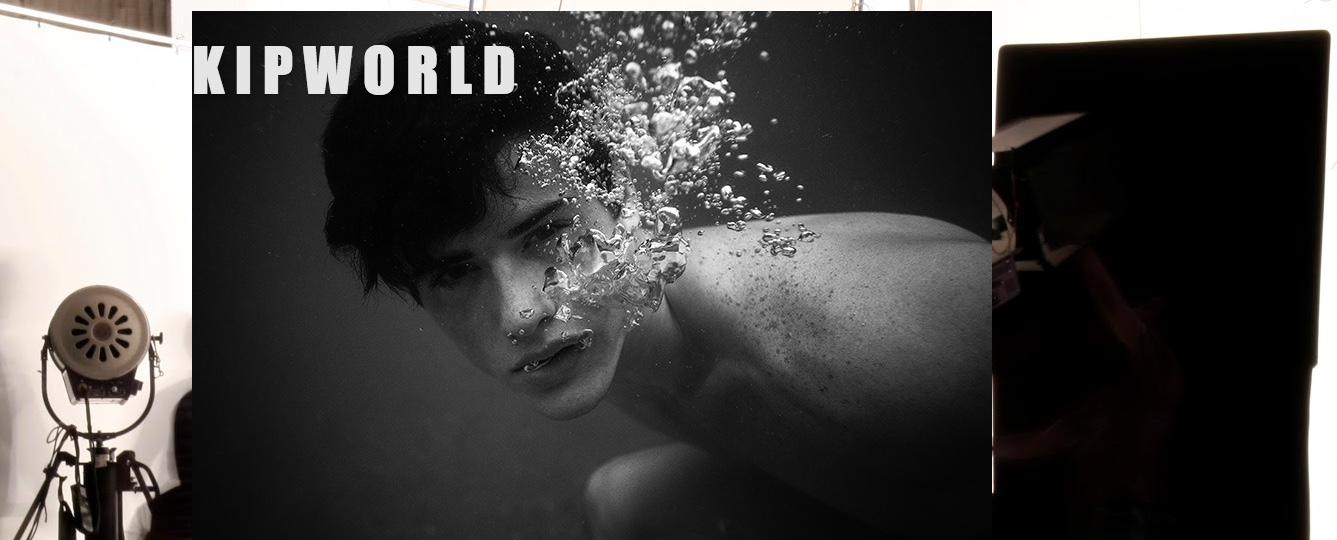 KIPWORLD, the personal weblog of Bournemouth University academic, Kip Jones, reached a milestone this week, measuring 250,000 page views in the all-time history of the blog.
KIPWORLD, the personal weblog of Bournemouth University academic, Kip Jones, reached a milestone this week, measuring 250,000 page views in the all-time history of the blog.
Begun in 2009, the blog averages about one article a month of around 1,000 words in length. These are definitely not the perhaps more typical ‘off-the-cuff’ or ‘stream of consciousness’ blogs, however. Jones pores over and reworks these pieces, sometimes for days, even weeks. He says that he tends to painstakingly write and rewrite anyway, so putting something out frequently was never going to work for him. One great things about on-line publishing is that you can continue to edit once an article is published, however.
Jones also writes for other blogs from time to time (LSE Impact blog, LSE Review of Books, Discover Society, Sociological Imagination, Creative Quarter, The Creativity Post, Bournemouth University Research Blog) as well.
As Jones reported earlier,
KIPWORLD is my personal blog where I write about projects that I am working on, but I also use it to develop my writing. A good example is a piece entitled, “How Breakthroughs Come: Tenacity and Perseverance”. First written for the blog, it was then reworked to include some reader responses to the earlier version. Through a Twitter connection, it was then published for a third time on the Social Research Hub, a site particularly aimed at PhD students in the Social Sciences.
Interestingly, the vast majority of the traffic to the site comes from Facebook where Jones moderates several special interest groups.The audience for KIPWORLD is predominantly in the USA, but the blog is viewed widely throughout the world.
The all-time top article on KIPWORLD is A summer holiday, three books and a story has received 17,499 views so far. The format is an exercise in creative autofiction, book review and a short story. This contribution to the site was written on holiday and is very much a personal reflection. A similar formula of tripartite creative writing developed by Jones recently made it to the pages of the academic journal, Qualitative Research Journal. (Interestingly, this ‘blog style’ article in an academic journal has been downloaded 30 times since publication in January 2017).
What might be called “How to” articles (such as What is a Systematic Review? or A Brief Outline for Organising/Writing the PhD Thesis) are also extremely popular.
Jones’ advice on blog writing to others:
 Find your own voice, even your own subject material. Use your blog to develop your writing and your personal style. Don’t just assume that it has to look and sound like a blog to be one. Include at least one picture with every blog article. Let people know about the blog through social media—don’t expect an audience to just find it on its own. Promote it.
Find your own voice, even your own subject material. Use your blog to develop your writing and your personal style. Don’t just assume that it has to look and sound like a blog to be one. Include at least one picture with every blog article. Let people know about the blog through social media—don’t expect an audience to just find it on its own. Promote it.
If the most important thing in your life IS to write about your cat, write about it as creatively as you possibly can. Enjoy the experience!
 From time to time, Jones holds an hour-long taster session, “Academic Blog Writing”. If you are interested in joining an upcoming session, please email
From time to time, Jones holds an hour-long taster session, “Academic Blog Writing”. If you are interested in joining an upcoming session, please email
CQR Seminar: Trevor Hearing & Kip Jones “In Conversation”
Next Wednesday, 1 pm Royal London House 303
‘In Conversation” Trevor Hearing (Media) and Kip Jones (HSS)
“Research as Film/Film as Research”
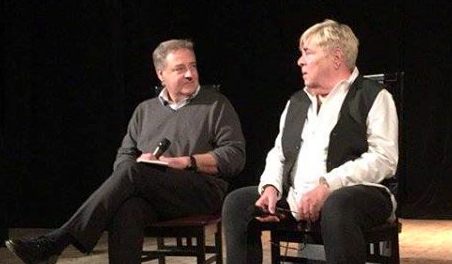
The two will present the research method as a CONVERSATION…first, between each other, and then with the audience. We are also asking that no PowerPoint be used in order that it is truly a conversation and NOT a lecture. All are welcome!
The series has been very popular so far, playing to a jam packed room. Come and join in the conversation.
Please note that there is a change of room from the regular location. The seminar will take place in RLH 303!
Many of us go to Naked next door for coffee following to continue the conversations and networking.
Come along and join in the conversation!
PPI Seminar 3: Recruitment and support in patient and public involvement
Recruiting and supporting participants to engage in meaningful patient and public involvement
Overview
Drawing on BU PIER’s experience of coordinating around 175 involvement activities each year, this interactive session will explore the what, why and how of recruiting and supporting people to be meaningfully involved in research.
Date Monday 3rd April 2017
Time 3:00 – 4:30 pm
Location EB708, Executive Business Centre, 89 Holdenhurst Road, Bournemouth University
As part of the Public and Patient Involvement (PPI) in Research seminar series
Book your place now: https://patientandpublicinvolvement.eventbrite.co.uk
Refreshments are available and there will be plenty of time for discussion at the seminar end. Queries please contact:
Dr James Gavin
Email jgavin@bournemouth.ac.uk
Phone +44 (0)1202566303
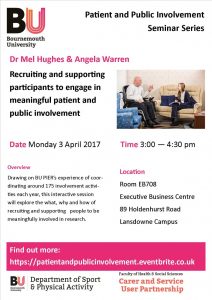
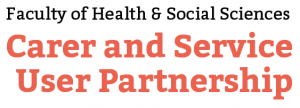
Nepal conference at BU
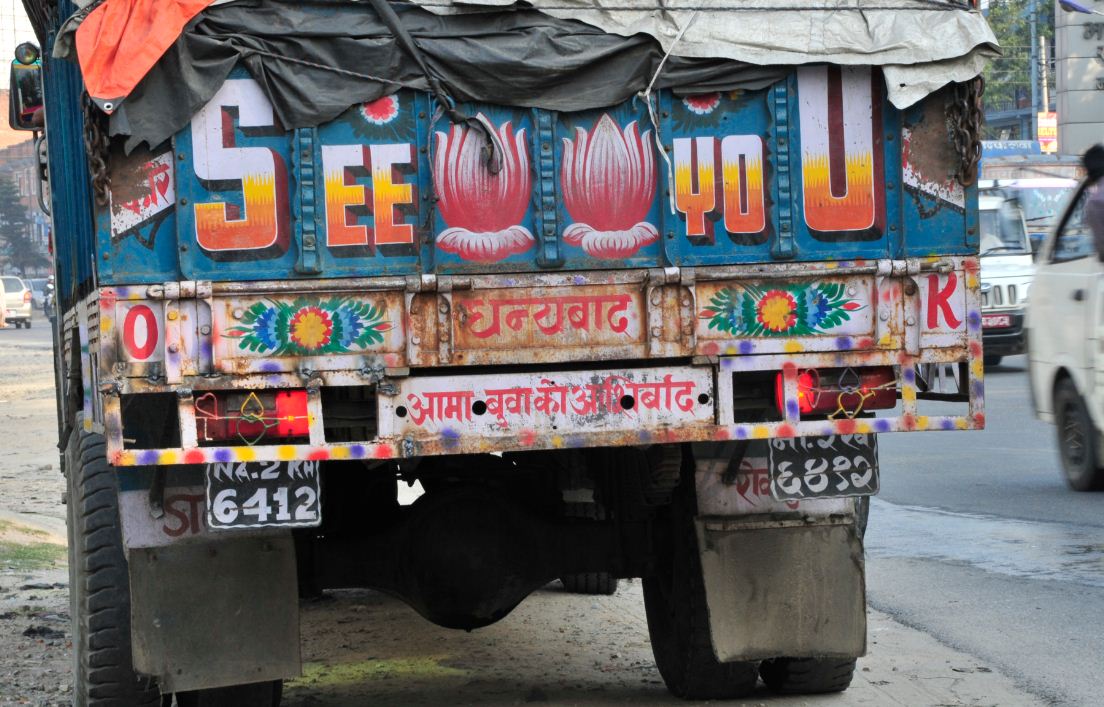 FHSS has the honour of hosting the 15th BNAC (Britain-Nepal Academic Council) Nepal Study Days on 12-13 April 2017. All presentations will focus on Nepal, its diaspora and/or the Nepali cultural world. This year’s programme includes a range of issues and studies from across different disciplines. In the past decade these study days have been at universities across the UK, including Liverpool John Moores University, the University of Oxford and the University of Edinburgh.
FHSS has the honour of hosting the 15th BNAC (Britain-Nepal Academic Council) Nepal Study Days on 12-13 April 2017. All presentations will focus on Nepal, its diaspora and/or the Nepali cultural world. This year’s programme includes a range of issues and studies from across different disciplines. In the past decade these study days have been at universities across the UK, including Liverpool John Moores University, the University of Oxford and the University of Edinburgh.
This year several presenters of oral presentations or posters are affiliated with BU (staff, PhD students and FHSS Visiting Faculty). These include the following presentations:
- Identifying the gaps in Nepalese migrant workers’ health and well-being: A review of the literature, by Padam Simkhada, Pramod Regmi, Edwin van Teijlingen & Nirmal Aryal
- Assessing the need and type of continuing professional development (CPD) for nurses trained and working in Nepal, by Bibha Simkhada, Edwin van Teijlingen, Padam Simkhada, Sean Mackey, Rose Khatri, Chandra Kala Sharma & Sujan Marahatta
As well as the following posters
- Reflections on THET-funded maternal mental health training in Nawalparasi, by Jillian Ireland, Andrea Lawrie, David Havelock, Padam Simkhada, Edwin van Teijlingen, Bibha Simkhada, Bhimsen Devkota, Lokendra Sherchan, Ram Chandra Silwal & Shyam K. Maharjan.
- Factors affecting health facility delivery in rural Nawalparasi district of Nepal, by Preeti K Mahato, Edwin van Teijlingen, Padam Simkhada, Zoe Sheppard & Ram Chandra Silwal
- Food belief practices amongst rural and urban mothers in Nepal: A qualitative overview, by Jib Acharya, Edwin van Teijlingen, Jane Murphy & Martin Hind
Come along to 14:Live on Tuesday 21 March
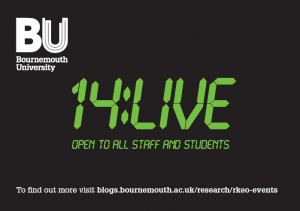
14:Live- Festival Fear of Missing Out (FoMO): What is it and how can you manage it?
Come along on 21 March at 2-3pm on Floor 5, Student Centre, Talbot Campus for the March edition of 14:Live.
Spring is fast approaching and festival season is just around the corner. Over the next few months you will be subjected to intense marketing campaigns from festival promoters, such as Glastonbury, Reading and Leeds, who will be telling you not to miss out on this year’s music festivals.
Many of your friends will be sharing their excitement about going to these festivals on social media. Social media has heightened the sensation that everyone but us appears to be having fun and many people have become more sensitive to FoMO appeals.
In this 14:Live, Dr Miguel Moital will discuss the psychology of ‘Fear of Missing Out’. What emotions come with FoMO? What marketing tricks are used to heighten FoMO? How can these emotions be managed?
With drinks and snacks provided, this will be a session you won’t want to miss!
All staff and students are welcome!
New publication: vital signs obstetric charts
 Congratulations on the Faculty of Health & Social Sciences team which had its paper ‘Vital signs and other observations used to detect deterioration in pregnant women: an analysis of vital sign charts in consultant-led UK maternity units’ accepted by the International Journal of Obstetric Anesthesia (published by Elsevier).
Congratulations on the Faculty of Health & Social Sciences team which had its paper ‘Vital signs and other observations used to detect deterioration in pregnant women: an analysis of vital sign charts in consultant-led UK maternity units’ accepted by the International Journal of Obstetric Anesthesia (published by Elsevier).
The paper compares: (i) vital sign values used to define physiological normality; (ii) symptoms and signs used to escalate care; (iii) 24 type of chart used; and (iv) presence of explicit instructions for escalating care. The authors conclude that the wide range of ‘normal’ vital sign values in different systems used in the UK and the Channel Islands suggests a lack of equity in the processes for detecting deterioration and escalating care in hospitalised pregnant and postnatal women. Agreement regarding ‘normal’ vital sign ranges is urgently required and would assist the development of a standardised obstetric early warning system and chart. The lead author of this new paper is FHSS Visiting Professor Gary Smith, his co-authors include FHSS staff Vanora Hundley, Lisa Gale_Andrews and Edwin van Teijlingen as well as three BU Visiting Faculty: Debra Bick (King’s College London), Mike Wee (Poole Hospital NHS Foundation Trust) and Richard Isaacs (University Hospital Southampton).
NVivo workshop and surgery – 23 March
As part of the Graduate School’s Research Development Programme 2016/17, Jacqueline Priego from CEL will be delivering an NVivo workshop. Details below:
Date: 23 March 2017
Time: 14.00 – 17.00
Venue: S103
Bookings via myBU *
Audience: This workshop is suitable for PGRs with some knowledge of qualitative analysis approaches.
Intended learning outcomes. By the end of this workshop you should be able to:
• Confidently identify the main elements of the NVivo interface
• Open and create new NVivo projects
• Prepare and modify documents
• Create codes and code documents
• Rearrange the coding system
• Perform simple retrieval of coded documents
• Use annotation and linking tools.
If you are already using NVivo for your research, you might like to drop in for the last half an hour of the session, when an open surgery will be held.
Jacqueline Priego has been delivering CAQDAS workshops and training postgraduate students and researchers on qualitative analysis since 2010. She is also available for queries relating to MAXQDA and QDAMiner (not supported at BU).
*Spaces are limited due to room capacity – please book through myBU to avoid disappointment.
14:Live Presents- Festival Fear of Missing Out (FoMO): What is it and how can you manage it?

Come along on Tuesday 21 March at 2-3pm on Floor 5, Student Centre on Talbot Campus for the March edition of 14:Live.
Spring is fast approaching and festival season is just around the corner. Over the next few months you will be subjected to intense marketing campaigns from festival promoters, such as Glastonbury, Reading and Leeds, who will be telling you not to miss out on this year’s music festivals.
Many of your friends will be sharing their excitement about going to these festivals on social media. Social media has heightened the sensation that everyone but us appears to be having fun and many people have become more sensitive to FoMO appeals.
In this 14:Live, Dr Miguel Moital will discuss the psychology of ‘Fear of Missing Out’. What emotions come with FoMO? What marketing tricks are used to heighten FoMO? How can these emotions be managed?
With drinks and snacks provided, this will be a session you won’t want to miss!
All staff and students are welcome!
PPI Seminar 2: How the Public can Inform Research Design – A Case Study
Importance of public involvement in research design: An orthopaedic case study
Lisa Gale-Andrews & Dr Zoe Sheppard
Date Monday 15th March 2017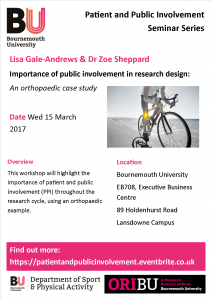
Time 3:00 – 4:30 pm
Location EB708, Executive Business Centre, 89 Holdenhurst Road, Bournemouth University
Overview
This workshop will highlight the importance of patient and public involvement (PPI) throughout the research cycle, using an orthopaedic example.
As part of the Public and Patient Involvement (PPI) in Research seminar series
Book your place now: https://patientandpublicinvolvement.eventbrite.co.uk
Refreshments are available and there will be plenty of time for discussion at the seminar end. Queries please contact:
Dr James Gavin
Email jgavin@bournemouth.ac.uk
Phone +44 (0)1202566303
Developing a novel self-optimising femtocell network for indoor communication with mobile devices
We would like to invite you to the latest research seminar of the Centre for Games and Music Technology Research.
Speaker: Haseeb Qureshi (Creative Technology PhD Student)
Title: Developing a novel self-optimising femtocell network for indoor communication with mobile devices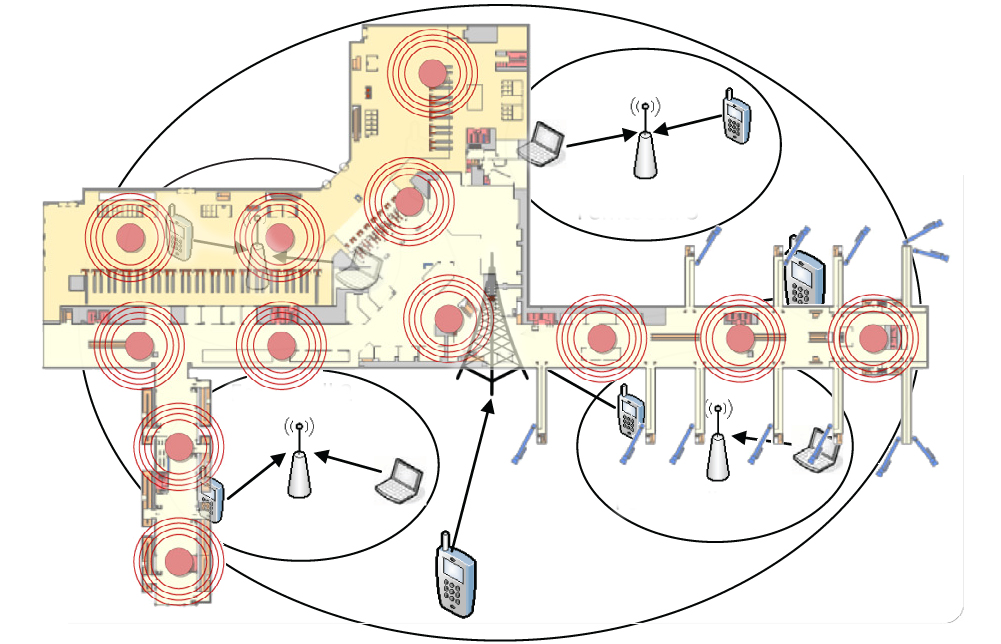
Time: 2:00PM-3:00PM
Date: Wednesday 15th March 2017
Room: PG11, Poole House, Talbot Campus
Abstract:
The need for a fast and reliable wireless communication system has increased with the development of social and business activities around the world. A promising cost and energy efficient way of meeting the future traffic demands is the idea of very dense deployment of low cost, low power and self-organizing small base stations i.e. Femtocells. Self-configuring, self-optimizing and self-healing base stations have the potential to significantly increase the capacity of mobile cellular networks in the future 5G while reducing their energy consumption. The aim of this research is to consider the integration of Femtocells as Self Optimising Networks for the future communication network. An extensive and thorough research has been carried out to investigate what drawbacks of the existing communication 4G network are and whether Femtocells as a Self-Optimising network can improve the current network. In order to evaluate the algorithms for self-optimising Femtocells that have been proposed by other authors in the existing literature an evaluation criteria has been developed, and a simulating environment has been constructed. The evaluation is performed by measuring the effect that changing parameters has on the output of the environment. From the results of the evaluation a new algorithm to enhance the self-optimisation of the network will be designed and developed in a simulating environment.
We hope to see you there.
Congratulations to your winners of the 2017 Research Photography Competition!
Bournemouth University researchers have given us a glimpse into some of their fantastic research, for the Research Photography Competition. The competition which ran in its third year challenged BU academics and students to capture the impact of their research in a single image. Researchers from across BU and all its faculties entered the competition.
Entries to the competition demonstrated some of the research taking place both here at BU and across the globe from forensic investigation, midwifery in Nepal, meeting the identity needs of older people and looked at repairing trust in the service sector.
The competition saw an overwhelming response with close to 1000 votes from BU staff, BU students and the wider BU community.
Vice Chancellor John Vinney congratulated the winners on 9 March in the Atrium Art Gallery.
“It’s been brilliant to be able to announce the winners. There’s a great diversity of winners that really encapsulate the range and impact of research here at BU,” commented Vice Chancellor John Vinney.
Below are your winners:
1st Place- “This is Me. I am Ron” by Chantel Cox

Chantel is a PhD student from the Faculty of Health and Social Science. She is looking at the cultural processes that underpin healthcare professionals meeting the identity needs of frail older people.
On winning first prize Chantel commented,
“It’s very exciting to win. It’s really good to get your research known about and out there in a different format. I’d like to use photography somehow in my research, so it’s really inspired me.”
2nd Place- The Compound Eye of Calliphora Vomitoria (Bluebottle fly) by Christopher Dwen

Christopher is a Forensic Research Assistant from the Faculty of Science & Technology. He’s been looking at the blood feeding activities of flies at crime scenes, as these can often be confounding. These patterns can help in instances of violent assaults.
3rd Place- A Concerted Effort to Repair Trust by Samreen Ashraf
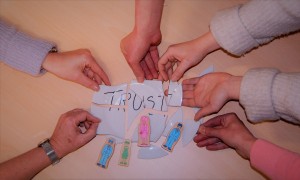
Samreen is a Lecturer in Marketing from the Faculty of Management.
Samreen is a Lecturer in Marketing from the Faculty of Management. Samreen has been looking at the service sector and examining trust repair endeavours from various stakeholders’ perspective related to three different contexts: mis-selling financial services (e.g. PPI); HR issues in the retail sector (e.g. Sports Direct) and safety issues within the leisure sector (e.g. Alton Towers).
All entries from this year’s Research Photography Competition are currently being exhibited in the Atrium Art Gallery until 22 March.
BU Postgraduate Conference 2017 – Prize Winners
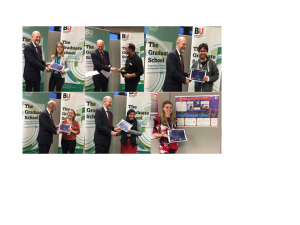
BU celebrated some of the best current PhD, Master’s by Research and MSc postgraduate research at its Postgraduate Conference 2017 yesterday. Winners of the oral presentations and academic poster and photography exhibition were announced at the end of the conference, listed below. Congratulations to everyone who participated.
Oral Presentations:
1st Prize Samantha Prince, PGR Faculty of Management
2nd Prize Magnhild Sletten, PGR Faculty of Science and Technology
3rd Prize Clare Gordon, PGR Faculty of Health and Social Sciences
Commended Prize Sara Glithro, PGR Faculty of Health and Social Sciences
Poster Presentation Winners: Paul Leal PGR FHSS, Maria Musarskaya PGR FoM, Walaa Naji Bajnaio PGR FMC, Sarah Hodge FST
Poster Presentation Commended: Lauren Bishop PGT FHSS, Tahani Mohamed PGR FoM, Phil Mathews PGR FMC, Dan Carter PGR FST
Photography Presentation Winner: Phil Mathews PGR FMC Commended: Resh Samauroo FMC
Enquiries to Debbie: pgconference@bournemouth.ac.uk












 REF Code of Practice consultation is open!
REF Code of Practice consultation is open! BU Leads AI-Driven Work Package in EU Horizon SUSHEAS Project
BU Leads AI-Driven Work Package in EU Horizon SUSHEAS Project Evidence Synthesis Centre open at Kathmandu University
Evidence Synthesis Centre open at Kathmandu University Expand Your Impact: Collaboration and Networking Workshops for Researchers
Expand Your Impact: Collaboration and Networking Workshops for Researchers ECR Funding Open Call: Research Culture & Community Grant – Apply now
ECR Funding Open Call: Research Culture & Community Grant – Apply now ECR Funding Open Call: Research Culture & Community Grant – Application Deadline Friday 12 December
ECR Funding Open Call: Research Culture & Community Grant – Application Deadline Friday 12 December MSCA Postdoctoral Fellowships 2025 Call
MSCA Postdoctoral Fellowships 2025 Call ERC Advanced Grant 2025 Webinar
ERC Advanced Grant 2025 Webinar Update on UKRO services
Update on UKRO services European research project exploring use of ‘virtual twins’ to better manage metabolic associated fatty liver disease
European research project exploring use of ‘virtual twins’ to better manage metabolic associated fatty liver disease